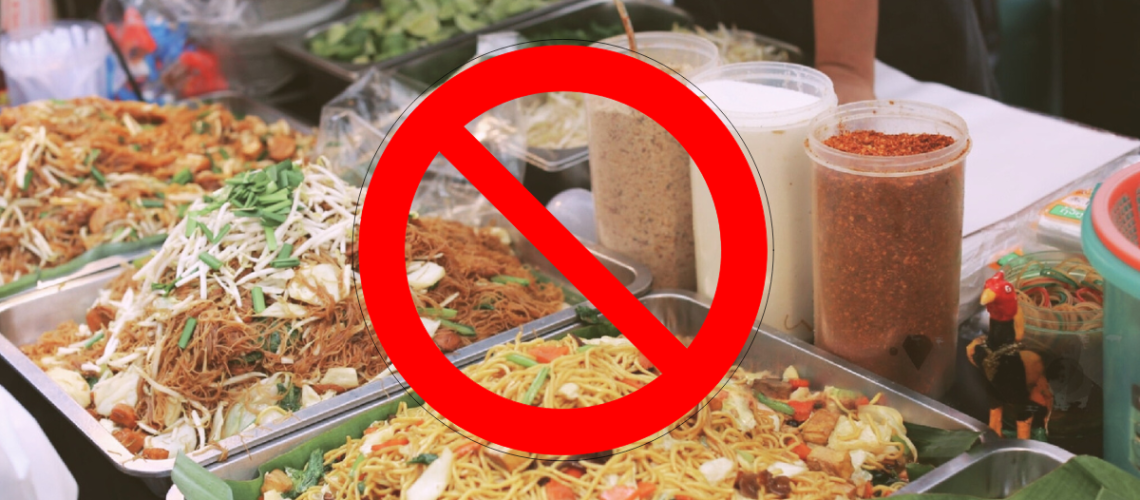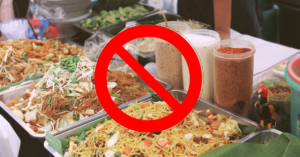Introduction
Street food is delicious and convenient, but indulging in it daily can lead to health problems. This article explores practical strategies to help you control your street food consumption, While still enjoying its occasional treats.
Understanding the Appeal of Street Food
Convenience and Accessibility
Street food is often readily available and quick to grab, making it a convenient choice for people on the go. The accessibility of street vendors, especially in bustling urban areas, adds to its appeal.
Affordability
One of the biggest draws of street food is its affordability. Many street food options are cheap, making them attractive for budget-conscious individuals.
Variety and Taste
Street food vendors offer various delicious and unique dishes, often reflecting the local cuisine and culture. This variety and the irresistible taste of these foods can make them hard to resist.
The Downsides of Eating Street Food Daily
Health Risks
Frequent consumption of street food can pose several health risks, including foodborne illnesses due to improper handling and storage of ingredients.
Nutritional Deficiencies
Many street foods are high in calories but lack essential nutrients. Relying on these foods can lead to nutritional imbalances and deficiencies.
Hygiene Concerns
Street food vendors may not always adhere to strict hygiene standards. This can increase the risk of consuming contaminated food, leading to digestive issues and other health problems.
Recognizing Triggers and Temptations
Emotional Eating
Many people turn to street food for comfort during stressful or emotional times. Recognizing this pattern can help you find healthier ways to cope with emotions.
Social Influences
Eating street food can be a social activity. Peer pressure or social gatherings around street food vendors can make it challenging to resist.
Environmental Factors
The sight and smell of street food can be powerful triggers. Understanding these environmental factors can help you develop strategies to avoid temptation.
Setting Realistic Goals
Defining Your Objectives
Start by setting clear and realistic goals for reducing your street food intake. Whether it’s cutting down to a few times a week or switching to healthier options, having a defined objective helps.
Creating a Timeline
Set a timeline for achieving your goals. Gradual changes are more sustainable than drastic measures, so plan a realistic timeline that allows for steady progress.
Being Patient with Progress
Understand that change takes time. Be patient with yourself and celebrate small victories along the way.
Planning Your Meals
Importance of Meal Planning
Planning your meals ahead of time can significantly reduce the temptation to eat street food. It ensures that you have healthier options readily available.
Preparing Meals at Home
Cooking at home allows you to control the ingredients and portion sizes. Try preparing some of your favorite street foods at home with healthier ingredients.
Healthy Snack Options
Keep healthy snacks on hand to curb cravings. Nuts, fruits, and yogurt are excellent options that can keep you satisfied between meals.
Finding Healthy Alternatives
Home-Cooked Street Food Recipes
Replicate your favorite street food dishes at home using healthier ingredients. This way, you can enjoy the flavors you love without compromising on health.
Healthier Street Food Vendors
Some street food vendors offer healthier options. Look for vendors who prioritize hygiene and use fresh, wholesome ingredients.
Substituting with Nutritious Options
Find nutritious substitutes for your favorite street foods. For example, swap fried snacks for baked or grilled alternatives.
Mindful Eating Practices
Understanding Hunger Cues
Learn to recognize true hunger cues versus cravings. This helps prevent unnecessary snacking on street food.
Eating Slowly and Savoring Food
Eating slowly allows you to savor the flavors and feel more satisfied with less food. It also aids digestion and helps you recognize when you’re full.
Avoiding Distractions While Eating
Focus on your meal without distractions. This practice, known as mindful eating, helps you enjoy your food and be aware of how much you’re consuming.
Incorporating a Balanced Diet
Importance of a Balanced Diet
A balanced diet provides the nutrients your body needs to function properly. It can help curb cravings and reduce the desire for unhealthy street food.
Including All Food Groups
Ensure your diet includes a variety of food groups: proteins, carbohydrates, fats, vitamins, and minerals. This helps maintain overall health and reduces the temptation for street food.
Monitoring Portion Sizes
Be mindful of portion sizes to avoid overeating. Eating smaller, more frequent meals can help keep your metabolism active and reduce cravings.
Staying Hydrated
Benefits of Drinking Water
Drinking water keeps you hydrated and can help control hunger. Sometimes, our bodies mistake thirst for hunger, leading to unnecessary snacking.
Avoiding Sugary Drinks
Sugary drinks are often calorie-dense and provide little nutritional value. Opt for water, herbal teas, or infused water to stay hydrated without the extra calories.
Hydration Tips
Carry a water bottle with you and set reminders to drink water throughout the day. Staying hydrated can help you avoid reaching for street food out of habit.
Exercising Regularly
Role of Exercise in Controlling Cravings
Regular physical activity helps regulate hunger hormones and reduce cravings. It also boosts your mood and energy levels, reducing the desire for comfort food.
Types of Exercises
Incorporate a mix of cardio, strength training, and flexibility exercises. Find activities you enjoy to make it easier to stick with a routine.
Creating a Workout Routine
Set a regular workout schedule that fits your lifestyle. Consistency is key to reaping the benefits of exercise.
Managing Stress
Stress and Its Impact on Eating Habits
Stress can trigger unhealthy eating habits, including the consumption of street food. Understanding this connection can help you manage stress more effectively.
Stress Management Techniques
Practice stress management techniques such as meditation, yoga, deep breathing exercises, or engaging in hobbies. These activities can help reduce the urge to eat street food.
Finding Healthy Outlets
Identify healthy outlets for stress, such as physical activity, creative pursuits, or spending time with loved ones. These alternatives can help you cope without resorting to unhealthy eating.
Building a Support System
Importance of Support from Family and Friends
Having a support system can make it easier to achieve your goals. Share your objectives with family and friends, and seek their encouragement.
Joining Health and Wellness Groups
Join groups focused on health and wellness. Being part of a community with similar goals can provide motivation and accountability.
Online Communities and Forums
Participate in online communities and forums related to healthy eating and lifestyle changes. These platforms can offer valuable tips and support from people with similar experiences.
Keeping a Food Diary
Tracking What You Eat
Keeping a food diary helps you track your eating habits and identify patterns. This awareness can guide you in making healthier choices.
Analyzing Eating Patterns
Review your food diary regularly to understand your eating patterns. Identify triggers and situations that lead to street food consumption.
Making Informed Changes
Use the insights from your food diary to make informed changes to your diet. Adjust your meal plans and strategies based on what you learn.
Conclusion
Controlling your street food intake is all about balance and making informed choices. By understanding your triggers, planning your meals, and incorporating healthy habits, you can enjoy street food occasionally without compromising your health. Remember, small, consistent changes can lead to significant long-term benefits.
FAQs
How can I resist the temptation of street food?
Resist temptation by planning your meals, keeping healthy snacks on hand, and avoiding situations that trigger cravings. Mindful eating and stress management techniques can also help.
What are some healthy street food alternatives?
Healthy alternatives include grilled or baked snacks, fresh fruits, salads, and homemade versions of your favorite street foods using wholesome ingredients.
How often is it okay to eat street food?
Occasional indulgence is fine, but try to limit street food to once a week or less. Balance it with a nutritious diet and regular exercise.
Can I still enjoy street food while being health-conscious?
Yes, you can enjoy street food occasionally while being mindful of portion sizes and choosing healthier options. Balance is key.
What are the long-term benefits of reducing street food consumption?
Reducing street food consumption can lead to improved overall health, better digestion, enhanced nutrition, and a lower risk of foodborne illnesses.









